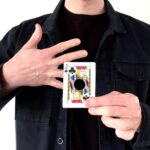As a master magician, you’d think I’ve seen it all, that my hands have mastered every trick, every sleight, every illusion. But there’s a truth I learned in front of that audience of 300 people: the unexpected is the true master of us all! That evening, what unfolded was a raw and revealing moment that shattered my mask of control. It was a humbling reminder that no matter how much we think we’ve perfected our craft, it’s the moments we can’t predict that shape us, that test our wits, and ultimately, forge us into better, more adaptable performers.
My act was in full swing with the crowd’s energy high, building anticipation for the highlight: my pickpocket routine! This was no ordinary magic trick; it demanded precision, timing and a touch of mischief. The premise was simple—I would secretly snatch personal items from my unsuspecting volunteers, while distracting them with a card trick—a classic misdirection. Normally, I’d take watches, wallets, keys—anything small and grabbable. But choosing the right participants was crucial! Usually, I’d select men who match my height and are wearing looser clothes for easier pickpocketing. Ideally, I can preselect these guys before I go onstage; I just scan the audience for suitable volunteers. Unfortunately, that night, I had my work cut out for me—I didn’t have time to preselect my ‘victims’.
In the spur of the moment, I quickly chose three random men from the front row. Surprisingly, it worked. I took a mobile phone from the first guy and keys from the second one, all while keeping them totally clueless. Then came the third guy, a suspicious type, but even he couldn’t resist my craft as I took his wallet. It was no easy maneuver. The wallet was big with tons of stuff inside, so it took some extra distraction to free it from his pocket.
At this point, I thought I hit the jackpot: I got all three items without getting caught! High on confidence, I felt pumped about flaunting my big reveal. I started by showing the big wallet; as predicted, the audience was delighted, laughing and clapping. Everyone seemed amused except for one—the owner of the wallet! After checking inside his jacket pocket to confirm it was taken, his mood soured. “I don’t appreciate this,” he said, snatching his wallet back, “you don’t touch my personal belongings. I really don’t like this!”. His angry outburst smacked down the cheer in the theater like a hammer. Frankly, I thought he was joking, so I asked him, “sorry, are you serious?”. “Yes of course!” he answered, still fuming.
The atmosphere shifted instantly; it threw off the whole vibe and energy in the room! Trying to keep my cool, I reminded myself to focus on the other two men since I still needed to reveal their phones. But when I showed these men I had their things, they both just gave me this “meh” kind of look. It seemed the first guy’s reaction had caught on. The whole situation was terrible and I felt really stupid. On impulse, I explained to the men and my audience that I’ve never had this heavy reaction before, but I respect their feelings and opinion. Despite apologizing and shaking hands with all three men, they all walked off stage with blank expressions. The tension was unbearable!

In my 20 years as a performer, I’ve never once had a bad reaction to my pickpocketing act. What’s worse, this shift in mood carried on for my entire show, making me uncomfortable until the very end.
After my show, audience members reassured me that my act was great. And according to many, my Mr.Wallet guy was being way over-dramatic. Some even suggested that he was probably the type who hated being fooled in public. Soon after, I managed to circle back to each of my three volunteers—two of them were feeling fine about the trick, just not Mr.Wallet guy who was still sulking.
The whole experience left a deep impression on me. To self-comfort, I considered that these things only happen once in a 1000 times. And for such a rare curveball, I shouldn’t let that one setback define the rest of my performances. So, for every future show, I was determined to keep doing my pickpocket act. I wasn’t going to let fear ruin a good laugh.
No matter how much we think we’ve “mastered” our craft, we should never stop learning. Humbled and committed to growing, I decided to change my pickpocketing approach. Now, I take the time to mingle with the audience before each show, searching for happy and outgoing personalities, which do well on stage. Here I introduce myself as the magician and weigh their interest in being my assistant for one of my acts. Of course they don’t know my act will be pickpocketing; but if they agree to volunteer beforehand, they’re usually good sports on stage. Plus, I’m picking people with personalities that match my showman style, which creates a fun synergy that enhances my overall performance.
And there’s another advantage to this method. While I engage my prospects in conversation, I can observe their pockets to gather information—sometimes, I even use a subtle touch. This way, I can infer which personal items they’re carrying and how to snatch them.
Bottom line, no matter how badly a performance strays from our plan, one thing is crucial: adapt, learn and return to the stage stronger. For life as a performer, it’s not just about the tricks up your sleeve, but the endurance of your spirit.







Leave a Reply